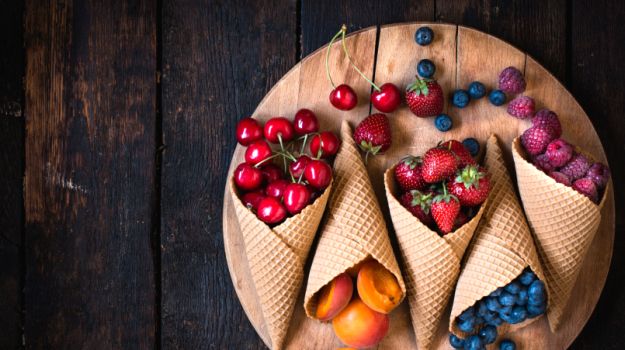
“Eating lots of potatoes will reduce your risk of getting stomach cancer,” according to enthusiastic media reports that seized on the UK’s love affair with the spud.
The mouth-watering headline followed the publication of a large Chinese review into the link between diet and stomach cancer, which involved 76 studies and 6.3 million people across several countries.
However, the news reports were perhaps a little hasty in their conclusions – the study didn’t find any specific link between eating potatoes and a lower risk of stomach cancer.
Stomach cancer is one of the most common cancers, accounting for almost 10% of cancer deaths. Research suggests some foods may help protect against stomach cancer, while others may increase the risk of getting it.
The media focus on potatoes seems to have come from the link researchers found between the cancer and white vegetables in general, such as potatoes, cabbage, onions and cauliflower.
The study found eating lots of different types of fruit, white vegetables and vitamin C was associated with a lower risk of stomach cancer.
A high intake of fruit was associated with a 7% reduction in stomach cancer. White vegetables were associated with a 33% lower risk. Meanwhile, a diet high in pickled vegetables, processed meats like sausages, salted foods and alcohol was associated with an increased risk.
Although it has several limitations, this large review will contribute to the growing body of evidence informing the dietary associations with stomach cancer.
However, it is not possible to give any firm conclusions based on this review alone. It is certainly not possible to say at this stage that eating potatoes will reduce your risk.
Where did the story come from?
The study was carried out by researchers from Zhejiang University in China, and was funded by the Chinese National Natural Science Foundation and the Natural Science Foundation of Zhejiang Province.
It was published in the peer-reviewed European Journal of Cancer.
The media seems to have gone with the slant that eating potatoes will decrease your risk of stomach cancer.
But this was not a specific finding of this review, which actually found a reduced risk of stomach cancer was associated with a higher consumption of “white vegetables”.
White vegetables include potatoes, as well as cabbage, cauliflower and onions. The review did not find any link at all when it looked specifically at potatoes.
What kind of research was this?
This systematic review aimed to pool the results of published prospective cohort studies that examined whether individual dietary factors are associated with stomach cancer risk.
As the researchers say, stomach (gastric) cancer is the fourth most common cancer in men and the fifth most common cancer in women worldwide, and counts for just under 10% of the deaths from cancer.
Dietary factors are believed to play a role in stomach cancer risk. Many previous observational studies have looked into this, including the large European Prospective Investigation into Cancer and Nutrition (EPIC) study.
The researchers say these studies suggest that processed meat may slightly increase risk, while a higher consumption of fruit and veg may decrease risk.
A systematic review is the best way to identify all published research on a given question and summarise what this evidence suggests.
Singling out individual dietary factors associated with health outcomes is challenging, as other dietary and lifestyle factors play a part, and it can be difficult to remove their effects.
Usually, drawing firm conclusions about what causes a particular disease requires drawing together a wide range of different types of evidence.
What did the research involve?
The researchers reviewed several literature databases to identify prospective cohort (observational follow-up) studies published up to the end of June 2015.
Eligible studies had to have looked at any dietary exposure (food, drinks or nutrients) and examined the risk of stomach cancer as the outcome.
Relevant studies were assessed for quality and two researchers independently extracted data from the studies to reduce the risk of error.
In total, 76 studies met the inclusion criteria, all of which were rated as being of moderate to high quality. These studies had followed a total of 6,316,385 people for 11.4 years, on average, and identified 32,758 new cases of stomach cancer over this period.
Thirty-seven of the studies were conducted in Europe, 11 in the US, 21 in Japan, four in China and three in Korea. The diets they were examining varied widely, from alcohol and salted foods to green tea and ginseng. The researchers pooled studies looking at the same food or food type to give an overall result.
What were the basic results?
Looking at studies examining fruit and vegetables, the results of 22 studies were pooled in an analysis of total vegetable consumption. No link was found with stomach cancer.
Meanwhile, 30 studies of total fruit consumption found a higher intake of fruit was associated with a 7% reduction in stomach cancer (relative risk [RR] 0.93, 95% confidence interval [CI] 0.89 to 0.98).
There was no association with stomach cancer for many of the specific fruits and vegetables examined. However, there were significant links with a few:
- white vegetables were associated with a 33% decrease in risk (RR 0.67, 95% CI 0.47 to 0.95; data came from six studies)
- pickled vegetables were associated with an 18% increase in risk (RR 1.18, 95% CI 1.02 to 1.36; data came from 20 studies)
- tomatoes were associated with an 11% increase in risk (RR 1.11, 95% CI 1.01 to 1.22; data came from five studies)
- spinach was associated with a 21% increase in risk (RR 1.21, 95% CI 1.01 to 1.46; data came from five studies)
Interestingly enough, despite the media focus on potatoes, no significant link was found between potatoes and stomach cancer (RR 0.93, 95% CI 0.82 to 1.06; seven studies).
Looking at other food types, significantly increased risk was found with:
- processed meat (13 studies)
- salted fish (11 studies)
- high-salt foods (12 studies)
- salt (8 studies)
- alcohol (24 studies)
- beer (13 studies)
- liquor (12 studies)
A few studies looked at the effects of specific nutrients. The one significant result to come out of these analyses was that vitamin C was found to reduce risk by 11% in a pooled analysis of five studies (RR 0.89, 95% CI 0.85 to 0.93).
Where there was data available to examine the quantities of a specific food or drink needed to have an effect, the researchers found significant links for:
- total fruit – 5% reduced risk per additional 100g a day
- citrus fruit – 3% reduced risk per additional 30g a day
There weren’t, however, significant dose links with white vegetables or vitamin C. If a factor dose directly affects risk, researchers would expect to see what they call a dose response – meaning the more fruit you eat, for example, the more your risk changes.
There were also significant dose links for:
- salted fish and high-salt foods (4% and 10% increase for each item per week, respectively)
- salt (12% increase per 5g a day)
- alcohol (5% increase per 10g a day)
How did the researchers interpret the results?
The researchers concluded that, “This study provides comprehensive and strong evidence that there are a number of protective and risk factors for gastric cancer in diet.”
They say their findings “may have significant public health implications with regard to prevention of gastric cancer, and provide insights into future cohort studies and the design of related clinical trials.”
Conclusion
This systematic review has gathered and summarised the results of prospective cohort studies published to date that have examined links between specific dietary items and the risk of stomach cancer.
The review has many strengths, including the large number of studies that have been reviewed and quality assessed, the large sample size, and extensive analyses carried out by individual food type.
But there are various points to note when interpreting these results. The media attention focused on potatoes and how we should eat these to reduce the risk of stomach cancer – this was not a finding of this study. It presumably comes from the decreased risk found with white vegetables.
However, exactly what white vegetables this included was not specified. Studies that specifically examined potatoes found no link with stomach cancer.
Also, researchers weren’t able to say how many white vegetables should be eaten to have a preventative effect. The researchers would expect to find this sort of link if a specific food is affecting the risk of stomach cancer.
Eating lots of fruit and vitamin C were also associated with a lower risk. But, again, while researchers could say each 100g increase in fruit a day was associated with a decreased risk, no dose response was found with vitamin C.
Given the varied results for fruit and vegetables – overall and by specific type – it is difficult to give specific advice, other than that the findings generally support advice to eat a healthy, balanced diet with plenty of fruit and vegetables.
While all the studies were rated to be of moderate to high quality, they varied widely in the population assessed, follow-up time and the main food item being examined.
There are many unknowns that could impact on the strength of the evidence found by the individual studies. This includes the methods of assessing dietary intake and over what period this was examined, how cancer outcomes were assessed, or whether researchers adjusted for other health and lifestyle factors that may influence the results.
For example, smoking is an established risk factor for stomach cancer. Smoking – or not smoking – may be associated with other “healthy” or “unhealthy” dietary habits.
Generally, a diet high in fruit – and possibly certain vegetables – has for some time been recognised to potentially decrease the risk of stomach cancer.
The World Cancer Research Fund published a similar review in 2007, concluding there was evidence to suggest that eating more fruit, non-starchy vegetables, and allium vegetables such as onions probably reduced stomach cancer risk, while salted and salty foods probably increased risk. At that point, there was not enough evidence to assess the effects of potatoes, vitamin C, or alcohol on stomach cancer risk.
This large study will contribute to the body of evidence informing the dietary associations with stomach cancer. However, it is not possible to give any firm conclusions based on this review alone. It certainly should not be advised that eating potatoes will decrease your risk of stomach cancer.
[“source-ndtv”]










